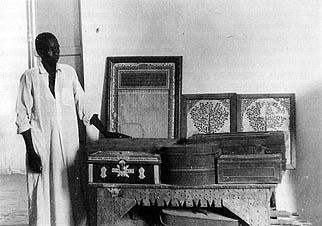| • | • | • |
Migration as a Theme in Mouride History
Mourides have been migrants since the early days of the brotherhood. In the past, cheikhs migrated with their taalibes to “pioneer lands” in the hinterlands in search of new farmland (Cruise O’Brien 1971: 60). Since their farming practices deplete the soil, Mourides were always in need of land, and even today Mourides continue to migrate within Senegal in search of new land.
The lives of New York street peddlers are also shaped by long years of travel. While other people from inhospitable regions migrate to establish themselves elsewhere, Mouride traders have continued, at least until now, to maintain their primary attachment to Senegal. A common saying is, “We are like the birds who think of home when flying high above the earth.”
Mourides find an explanation and some consolation for their transient lives in the brotherhood’s history. They say that travel leads to knowledge, xam-xam, which is essential to a young man’s education.[4] Travel and life in another country, and perhaps a foreign wife, add to one’s understanding of the world. The number of countries one has “done” (“faire la France [l’Italie, le Maroc, etc.]”) and the languages one speaks are frequent subjects of conversation at Mouride gatherings.
Travel has become an almost sacred activity for Mourides, and its special status can be seen in the large round house in Diourbel where Cheikh Amadu Bamba was confined by the French, where his suitcases have been preserved along with his books (fig. 19). By also becoming travelers, Mourides emphasize their ties with their founding saint.

Figure 19. Cheikh Amadu Bamba’s suitcases, Diourbel, Senegal. Photograph by Victoria Ebin.
Travel entails hardship, and one Mouride trader, a migrant for thirteen years, explained that Amadu Bamba wanted his followers to leave home to test their faith. Another underlined the theme: “We know misery so well that we have come to love it, so much that now we conjugate it as a verb, ‘Moi, je misère à New York; toi, tu misères à Paris.’ ”